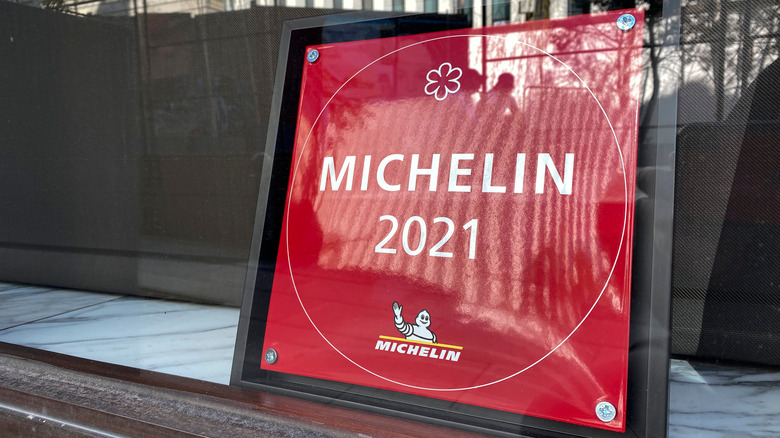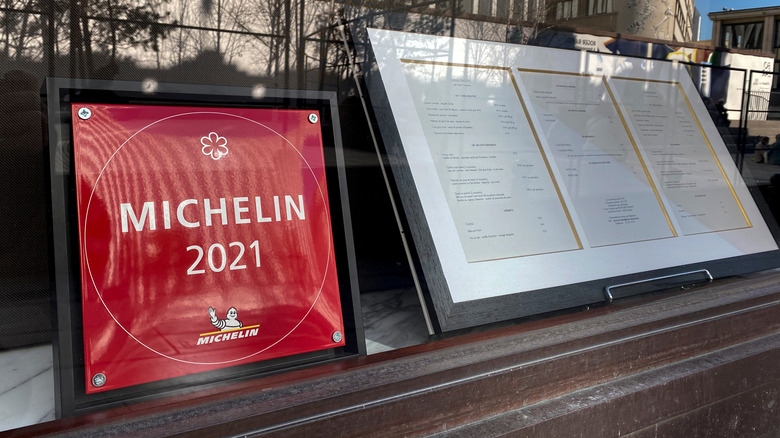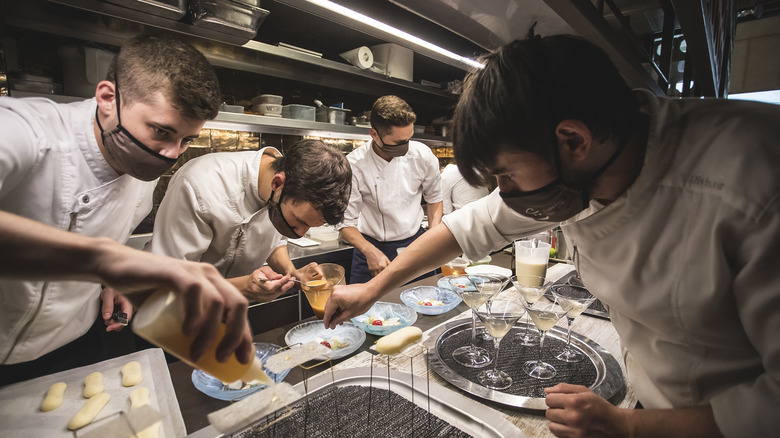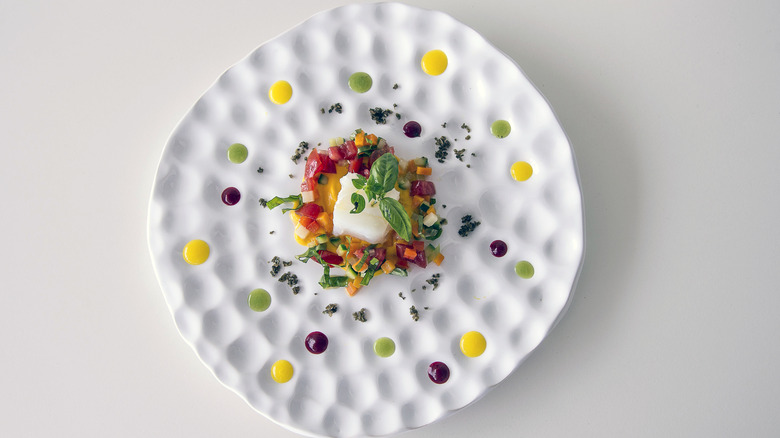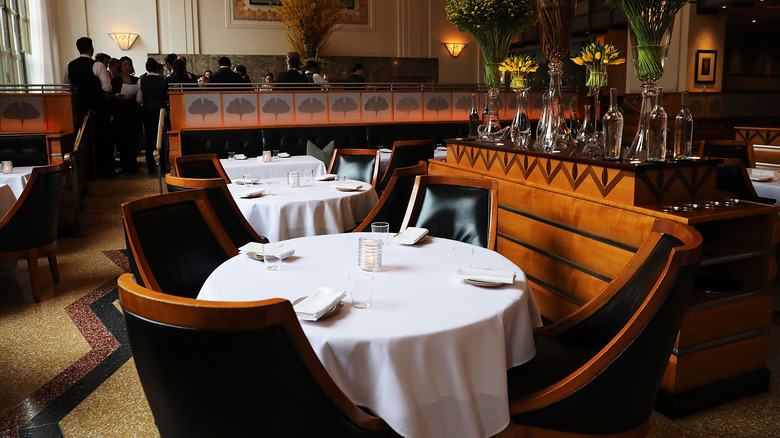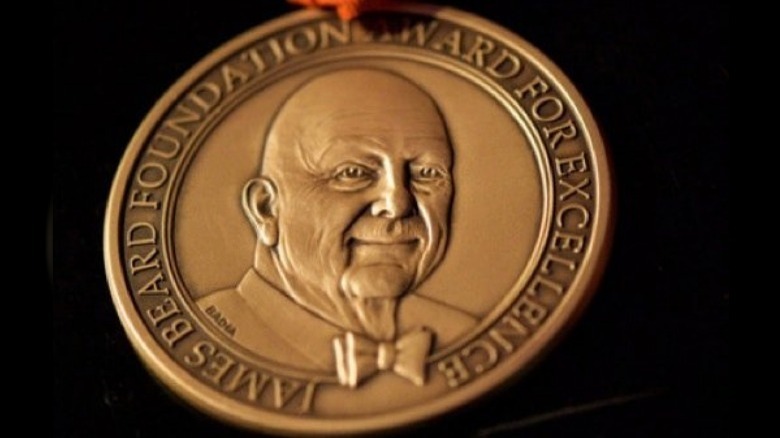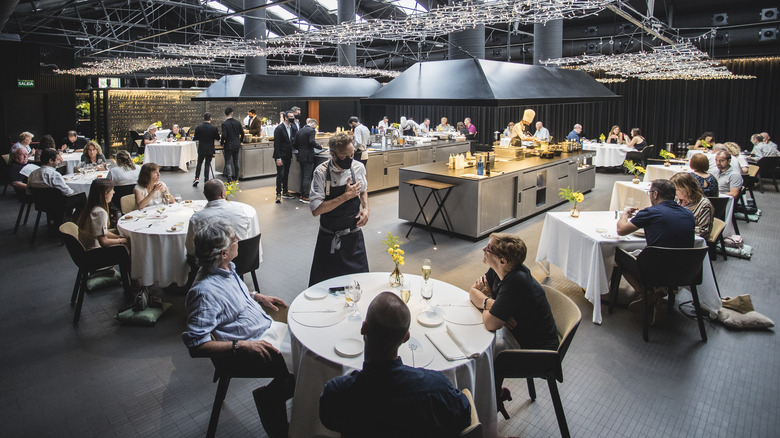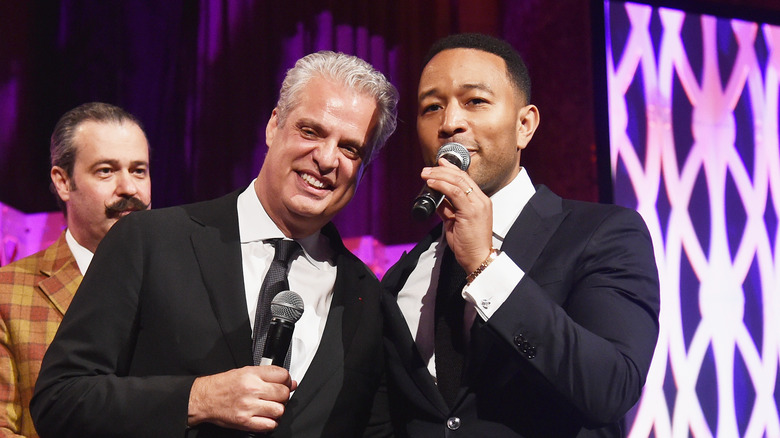The Real Reason Why Some Famous Chefs Don't Want Michelin Stars
In the late 1880s, brothers Andre and Edouard Michelin were looking for a way to market their new tire company. The automobile industry in their native France was still in its infancy. In order to get people driving, and thus increasing car and tire sales, the duo produced a guide filled with maps, fuel station locations, and similar road trip information.
By the 1920s, the guide had grown to include lists of hotels and restaurants. Seeing the popularity of its restaurant section, the brothers began employing food critics, and in 1926, the Michelin Guide awarded its first stars to the best culinary establishments.
Fast-forward a century and a Michelin Guide star is still considered among the most prestigious and exclusive awards a restaurant can receive. There are just over 3,000 Michelin-starred restaurants in the world. Of those, only 132 currently have a three-star rating. But while a Michelin star is still lusted over by many, it is not quite as valued by the world's best chefs as it used to be. Between the immense stress that comes along with the stars to the financial hit they can cause, here are the real reasons why some famous chefs don't want Michelin stars.
The Michelin stars aren't awarded to the chefs in the first place
We need to start off by acknowledging that Michelin stars are not awarded to chefs. This may come as a surprise considering how often the term "Michelin-star chef" is thrown around. But remember, the stars represent the guide's recommendations of where to eat, not whose cooking to eat. That's why stars are awarded to the restaurant, not to the person in the kitchen. This makes a Michelin star unique from other accolades such as a James Beard Award, which acknowledges the restaurant where a chef works, but bestows the honor on her or him.
If a chef leaves a restaurant to work elsewhere, the restaurant's Michelin stars do not come with them. Likewise, if a restaurant closes down and reopens with a different name, concept, etc., any stars it had previously earned do not get grandfathered in. So those individuals who don't want stars need not worry too much, because technically, they can't have any.
Michelin stars create immense stress
Being awarded a Michelin star can seem like the culmination of the decades of work put in by a chef. But in many ways, the star is just the beginning. Stars aren't awarded on an indefinite basis. Restaurants are constantly reevaluated, forcing them to maintain their incredibly high standards at all times or risk the guide taking a star away.
Kitchens are already notoriously high-stress environments. Instead of being able to take a sigh of relief and enjoy a Michelin star award, chefs have to continue keep up their outlandishly high standards non-stop, creating an unrelenting amount of stress. "Michelin guide is a cruel system. It's the cruelest test in the world," South Korean chef Eo Yun-gwon told CNN. "It forces the chefs to work around a year waiting for a test [and] they don't know when it's coming."
Because of the stress at Michelin establishments, some chefs have started giving back stars they've received or asking not to be evaluated. Several years ago, French chef Sébastian Bras asked to be excluded from the Michelin Guide, pointing to the high pressure of running a fine-dining kitchen. More recently, Swedish chef Magnus Nilsson went as far as closing his restaurant. "I am not going to lie," he wrote on Instagram. "I am a little bit tired after all this time pushing the development of the restaurant forward."
Losing Michelin stars can be emotionally devastating
It's better to have loved and lost than to have never loved at all, but it may be better to have never won a Michelin star than to have won one and lost it, because when a restaurant loses a Michelin star, it can be a crippling blow to a chef's morale. There are numerous stories of talented men and women spiraling downward after a poor review. It even got to the callous Gordon Ramsay, who compared his two-star New York restaurant losing its rating to losing a girlfriend. "I started crying when I lost my stars," he told the Daily Mail. "It's a very emotional thing for any chef."
A drop in star rating can have even more dire consequences. In 2003, French chef Bernard Loiseau committed suicide just months after learning his three-star restaurant may lose its third star. According to The New Yorker, "it was widely believed that the possibility of a demotion drove Loiseau to suicide."
If you or anyone you know is having suicidal thoughts, please call the National Suicide Prevention Lifeline at 1-800-273-TALK (8255).
Michelin stars prevent chefs from cooking the food they want
We know that with great power comes great responsibility, but in the culinary world it's more along the lines of "with great prestige come great expectations."
If a chef earns a Michelin star, they often feel obligated to serve the same food and create the same dining experience that earned them said stars. The reason is twofold. On the one hand, they want to meet the expectations of their guests who have read the rave reviews. On the other, restaurants are continually up for reevaluation by Michelin; making any significant changes might result in a loss of stars the next time a reviewer walks in the door.
This expectation works in direct opposition to a chef's creative nature, preventing them from cooking anything that might not be deemed Michelin-worthy. According to Vanity Fair, Spanish chef Julio Biosca returned his restaurant's star because he felt the award prevented him from innovating. Belgian chef Frederick Dhooge did the same, citing a desire to cook simpler food like fried chicken. "The essence of the kitchen ... lies with the product, prepared according to the classical way and with respect for our own gourmet traditions and values," he wrote on the restaurant's Facebook page (via Eater). "We noticed that this is not always understood by a group of customers that expect a spectacle ... I want to be free in my kitchen."
Michelin stars can actually hurt a restaurant financially
It's easy to think a Michelin star means big business for a restaurant. Added exposure leads to more guests, which leads to more money. And for some eateries, that's precisely what happens — but not for all.
You cannot make more money by serving more people if you are not making a profit off of each diner. This is the problem many Michelin restaurants run into. Although they often have average checks of hundreds of dollars, the high quality of ingredients and labor-intensive preparation come at a high cost to the restaurant, leaving little room for profit. "Were the customers' bills our only income, the restaurant wouldn't be profitable," Spanish chef Pepe Solla told PRI The World. "Some dishes on our menu simply do not generate profit."
But even if the food was profitable, maintaining a restaurant that meets Michelin standards is a pricey task. This usually involves a large financial investment in service and decor, reports Food & Wine, something the restaurant might not have choose to do if it weren't for Michelin. "It becomes impossible not to paint the restaurant for one or two years or not to replace a slightly torn napkin," Solla said.
This was all summed up in a study from Cornell Hospitality Quarterly, which found numerous two- and three-Michelin-starred restaurants to be in the red.
Chefs don't trust Michelin's rating process
One of the first chefs to give back his stars was Marco Pierre White, which he did in 1999 while simultaneously walking away from the restaurant industry altogether. Just five years earlier, at age 32, he'd become the youngest chef to ever be awarded three Michelin stars. "The people who gave me Michelin stars had less knowledge than me," he told The Guardian. "You have to place a value on something that is given to you: that's why it was so easy for me to walk away. They had no value for me."
White wasn't the last chef to question the pedigree of Michelin's inspectors. "In my opinion, they are incompetent!" chef Marc Veyrat told CNN. "Do you realize they mixed up Reblochon and cheddar?"
Michelin is notoriously tight-lipped about its judging process, criteria, and the identities of its inspectors. Veyrat's comments, in fact, came after filing a suit demanding Michelin reveal the reason his restaurant lost its third star. "I'm ready to accept losing a star, but they have to tell me why." The French chef went as far as questioning whether anyone from Michelin actually ate at his eatery. He requested the guide be required to hand over checks to prove they were there. Ultimately, he lost the suit and the mystery remains.
Michelin stars have lost their luster
Not too long ago, Michelin was the lone restaurant surveyor with any credibility on the block. But the rest of the world has caught up, and the passing years have brought a new wave of competition. There are now countless culinary awards and review platforms for consumers to consider, diluting Michelin's influence.
Starting at the top is The World's 50 Best Restaurants, which since 2002 has published an annual list of the best restaurants on Earth. As opposed to Michelin, World's Best Restaurants does not have a secretive voting process. "A top ten placing in the 50 Best Restaurant rankings can have a greater impact than holding three stars," writes The Week. The James Beard Awards, on the other hand, have celebrated chefs in the U.S. with honors in a variety of categories each year since 1991.
But it's not just prestigious awards that have eaten into Michelin's importance. It's also the common, everyday tools that consumers use to decide where to eat. Sites and apps such as Yelp are used by millions of people around the world. They can give eaters insight into nearly any restaurant, delivered directly from real customers. If people want to learn about the quality of a restaurant, they don't need purchase a Michelin Guide like they had to in the past.
Some chefs believe Michelin is out of touch
According to Michelin's rating system, a one-star restaurant is "worth a stop." This vagueness might seem like it opens Michelin up to a wide array of restaurants. But according to some chefs, Michelin only acknowledges a very specific type of cuisine. "If you're not in the European, French model, you're just at a disadvantage, right off the bat," food writer Eddie Kim told LA Magazine. "Michelin says that they're trying to modernize and increase diversity in the panel of inspectors and people who make the decisions, but so far we haven't seen any evidence."
This narrow point of view immediately eliminates most of the world's food. "There is nothing that Michelin, as a Eurocentric fantasy fiction, can contribute to the dialogue about what it means to be Californian, Angeleno, or Latino American that we can't learn from each other or from the profoundly informed and inclusive work of our home-grown voices," acclaimed California chef Carlos Salgado wrote on Twitter. Cosme chef Daniela Soto has similar distaste for the Michelin dining experience. "I just don't even worry about Michelin ... I see what the qualification of becoming a three-star Michelin restaurant needs to be and I hate tablecloths," she said, referring to the guide's preference for eateries with fine linen tablecloths.
Whether it's the food, the focus on hours-long tasting menus, or the overlooking of female-led restaurants, Michelin does not seem to notice how much the culinary world has changed.
Chefs don't need the publicity like they used to
The Michelin Guide began as a marketing tactic and for a long time the publicity from being included was unparalleled. It's still true that a Michelin star can equal bigger business. But, simply put, the guide isn't the only source of attention anymore. Chefs and their restaurants can get just as much attention, if not more, from a spot on the World's 50 Best Restaurant list, for example. "It's kind of reached the point where more people are just ignoring the Michelin," food writer Eddie Kim said in LA Magazine. "We're more likely to look to James Beard Awards or Bon Appetit as institutions that offer meaningful recognition."
But it's not just other culinary acknowledgments that Michelin is up against -– it's the ever-growing media landscape. Between cooking shows, documentaries, and books many of the world's best chefs have become household names. And let's not forget about the power of social media. There's a very strong case to be made that a viral post would attract far more eyeballs than a mention in the Michelin Guide. And that's a huge reason why some famous chefs don't want Michelin stars.
